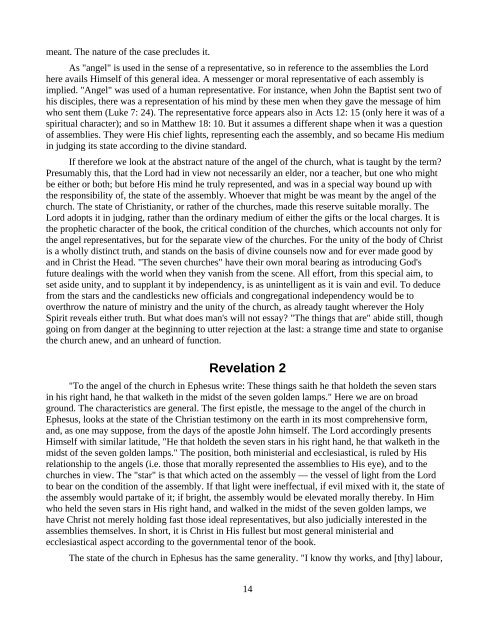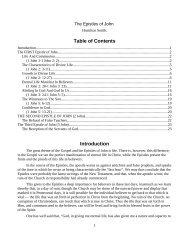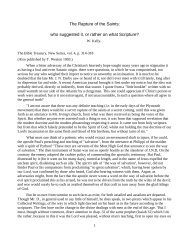An Exposition of Revelation .pdf
An Exposition of Revelation .pdf
An Exposition of Revelation .pdf
Create successful ePaper yourself
Turn your PDF publications into a flip-book with our unique Google optimized e-Paper software.
meant. The nature <strong>of</strong> the case precludes it.<br />
As "angel" is used in the sense <strong>of</strong> a representative, so in reference to the assemblies the Lord<br />
here avails Himself <strong>of</strong> this general idea. A messenger or moral representative <strong>of</strong> each assembly is<br />
implied. "<strong>An</strong>gel" was used <strong>of</strong> a human representative. For instance, when John the Baptist sent two <strong>of</strong><br />
his disciples, there was a representation <strong>of</strong> his mind by these men when they gave the message <strong>of</strong> him<br />
who sent them (Luke 7: 24). The representative force appears also in Acts 12: 15 (only here it was <strong>of</strong> a<br />
spiritual character); and so in Matthew 18: 10. But it assumes a different shape when it was a question<br />
<strong>of</strong> assemblies. They were His chief lights, representing each the assembly, and so became His medium<br />
in judging its state according to the divine standard.<br />
If therefore we look at the abstract nature <strong>of</strong> the angel <strong>of</strong> the church, what is taught by the term?<br />
Presumably this, that the Lord had in view not necessarily an elder, nor a teacher, but one who might<br />
be either or both; but before His mind he truly represented, and was in a special way bound up with<br />
the responsibility <strong>of</strong>, the state <strong>of</strong> the assembly. Whoever that might be was meant by the angel <strong>of</strong> the<br />
church. The state <strong>of</strong> Christianity, or rather <strong>of</strong> the churches, made this reserve suitable morally. The<br />
Lord adopts it in judging, rather than the ordinary medium <strong>of</strong> either the gifts or the local charges. It is<br />
the prophetic character <strong>of</strong> the book, the critical condition <strong>of</strong> the churches, which accounts not only for<br />
the angel representatives, but for the separate view <strong>of</strong> the churches. For the unity <strong>of</strong> the body <strong>of</strong> Christ<br />
is a wholly distinct truth, and stands on the basis <strong>of</strong> divine counsels now and for ever made good by<br />
and in Christ the Head. "The seven churches" have their own moral bearing as introducing God's<br />
future dealings with the world when they vanish from the scene. All effort, from this special aim, to<br />
set aside unity, and to supplant it by independency, is as unintelligent as it is vain and evil. To deduce<br />
from the stars and the candlesticks new <strong>of</strong>ficials and congregational independency would be to<br />
overthrow the nature <strong>of</strong> ministry and the unity <strong>of</strong> the church, as already taught wherever the Holy<br />
Spirit reveals either truth. But what does man's will not essay? "The things that are" abide still, though<br />
going on from danger at the beginning to utter rejection at the last: a strange time and state to organise<br />
the church anew, and an unheard <strong>of</strong> function.<br />
<strong>Revelation</strong> 2<br />
"To the angel <strong>of</strong> the church in Ephesus write: These things saith he that holdeth the seven stars<br />
in his right hand, he that walketh in the midst <strong>of</strong> the seven golden lamps." Here we are on broad<br />
ground. The characteristics are general. The first epistle, the message to the angel <strong>of</strong> the church in<br />
Ephesus, looks at the state <strong>of</strong> the Christian testimony on the earth in its most comprehensive form,<br />
and, as one may suppose, from the days <strong>of</strong> the apostle John himself. The Lord accordingly presents<br />
Himself with similar latitude, "He that holdeth the seven stars in his right hand, he that walketh in the<br />
midst <strong>of</strong> the seven golden lamps." The position, both ministerial and ecclesiastical, is ruled by His<br />
relationship to the angels (i.e. those that morally represented the assemblies to His eye), and to the<br />
churches in view. The "star" is that which acted on the assembly — the vessel <strong>of</strong> light from the Lord<br />
to bear on the condition <strong>of</strong> the assembly. If that light were ineffectual, if evil mixed with it, the state <strong>of</strong><br />
the assembly would partake <strong>of</strong> it; if bright, the assembly would be elevated morally thereby. In Him<br />
who held the seven stars in His right hand, and walked in the midst <strong>of</strong> the seven golden lamps, we<br />
have Christ not merely holding fast those ideal representatives, but also judicially interested in the<br />
assemblies themselves. In short, it is Christ in His fullest but most general ministerial and<br />
ecclesiastical aspect according to the governmental tenor <strong>of</strong> the book.<br />
The state <strong>of</strong> the church in Ephesus has the same generality. "I know thy works, and [thy] labour,<br />
14






